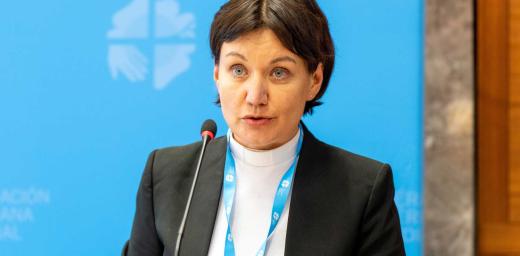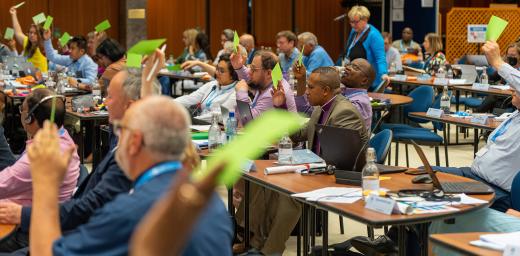(LWI) - It is “shocking and deeply disturbing” that nearly 193 million people in 53 countries experience a food crisis yet there is enough in the world to feed everyone. The Lutheran World Federation (LWF) governing body made these observations at its annual meeting in Geneva, as it called on the international community to address the root causes and key drivers of the global hunger crisis sustainably.
In a public statement, the LWF Council recognized how the war in Ukraine, the climate crisis and COVID-19 pandemic have worsened food insecurity. It expressed concern that government responses to increasing crises should not be at the detriment of existing humanitarian and development aid commitments.
“As we pray for our daily bread, we know that people cannot live full lives without dignity and adequate food,” the Council noted.
LWF Council statement on the global hunger crisis
The Council finds it shocking and deeply disturbing that there are nearly 193 million people in 53 countries experiencing food crisis.
The human right to food is recognized in the Universal Declaration of Human Rights as part of the right to an adequate standard of living, and is enshrined in the 1966 International Covenant on Economic, Social and Cultural Rights. As we pray for our daily bread, we know that people cannot live full lives with dignity without adequate food.
While the root causes of global hunger and food insecurity are complex, the Council recognizes the devastating role played by conflicts, including the war in Ukraine, the climate crisis, COVID-19, poor government policies and practices, as well as economic pressures, particularly in regions that were already experiencing perennial humanitarian crises. The Council is concerned that, while the needs for support increase in many regions, several governments have reallocated development aid to the Ukraine crisis. Government responses to this crisis should be in addition to existing humanitarian and development aid commitments.
The Council acknowledges that there is enough food and resources in the world to feed everyone; nevertheless, existing systems and structures have led to levels of inequality, where a few have much more than they need and others very little or nothing at all. Addressing the root causes of the global food crisis will require addressing greed, overconsumption, profit-driven industrialized over-production and promoting nature preserving agroecological approaches. The Council affirms the important role that women play in food production and decries social biases, discriminatory laws and practices that hinder their rights, access and ability to meaningfully contribute.
The Council stands in solidarity with the millions of people who are hungry and reaffirms the commitment of the LWF to take action to alleviate their suffering, and prays that God will comfort them and provide for them.
The Council calls on:
- The international community to increase its level of humanitarian and development aid to respond to the unfolding global food crisis, prioritizing countries and regions that are particularly affected.
- The international community to mobilize the necessary resources and political will to collectively and sustainably address the global hunger and food crisis, its root causes and key drivers, including poverty, conflicts and the climate crisis.
- Governments to prioritize resources for developing more sustainable food systems, focusing on agroecological approaches that include a stronger focus on human rights, justice, and care for creation, also in the context of implementing the Sustainable Development Goals.
- Governments to redouble their efforts towards addressing the climate crisis, with a stronger focus on reduction of emissions and supporting developing countries with resources to enable them to tackle impacts such as droughts and food insecurity.
The LWF Council is the highest authority of the LWF between Assemblies. It consists of the President, the Chairperson of the Finance Committee, and 48 members from LWF member churches in seven regions. The current governing body was elected at the May 2017 Twelfth Assembly in Windhoek, Namibia. The 2022 meeting takes place, 9-14 June, at the Ecumenical Center in Geneva.






